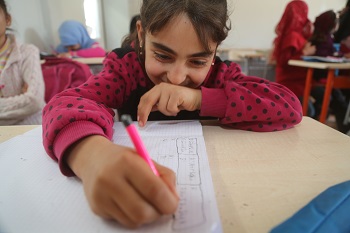EU and UNICEF to reach thousands of refugee children in Turkey with Conditional Cash Transfer for Education
The European Union and UNICEF have launched the largest ever EU humanitarian contribution to Education in Emergencies, valued at EUR 34 million. The Conditional Cash Transfer for Education (CCTE) project aims to increase the number of refugee children enrolled in and attending school in Turkey.

On 16 January 2017, a girl in a Turkish language class in Nizip 1 refugee camp, Gaziantep, southern Turkey. Nizip 1 camp is home to over 10,000 Syrian refugees, including more than 5,000 children.
The new commitment reflects the objectives of the "No Lost Generation" initiative to provide children affected by the conflict in Syria with access to education and other vital services, and builds on the significant efforts by the Government of Turkey to support refugee children.
Out of the almost 3 million Syrian refugees in Turkey, 1.3 million are children, of whom nearly half a million are already enrolled in school. However, despite this achievement and the firm commitment of the Government of Turkey, significant challenges remain to provide all refugee children with access to education.
The CCTE project will build on the Emergency Social Safety Net (ESSN), which was launched by the European Commission in September 2016, by providing families with targeted cash transfers to encourage some 230,000 children to attend school regularly.
"The EU is committed to supporting refugee children in Turkey and beyond. Education in emergency situations is a top EU priority. Our moral duty is to save this generation of refugee children and invest in their future. We have teamed up with experienced humanitarian organisations to make this programme a real success." stated Commissioner for Humanitarian Aid and Crisis Management, Christos Stylianides.
“Children do not need education even in emergencies, they need education especially in emergencies so they can someday rebuild their lives – and their countries,” said UNICEF Executive Director Anthony Lake. “Thanks to the EUs generosity and Turkey’s leadership, UNICEF and our partners are already helping thousands of children to go to school and learn. The CCTE will help us reach 230,000 children – a major step in preventing a lost generation.”
In order to improve access to education for vulnerable children in both Turkish public schools and Temporary Education Centres (TECs), the CCTE project will extend the national CCTE programme to reach a large number of refugee children. The existing CCTE programme has been open to children born outside Turkey since its inception in 2003.
As of May 2017, bimonthly cash-transfers will be made to vulnerable refugee families whose children attend school regularly. The project also includes a strategic child protection component in order to ensure the continued school enrolment and attendance of the most vulnerable refugee children as well as their referral to complementary child protection services as required.
The CCTE project will be implemented jointly by the Government of Turkey, UNICEF and the Turkish Red Crescent.
“I am very glad that the Turkish Red Crescent (Kizilay) Card is changing the lives of Syrian children who are our guests,” the President of the Turkish Red Crescent, Kerem Kinik, stated. “I thank the European Union and UNICEF for their joint effort for Syrian students in Turkey. In order not to have a lost generation in our region, the whole world should do whatever it can. In this respect, I consider this project as a very important one.”
The project will build upon the expertise and systems of the Turkish Ministry of Family and Social Policy and the Ministry of National Education, with the support of the Directorate General for Migration Management and under the coordination of the Disaster and Emergency Management Presidency. Turkey’s Integrated Social Assistance Information System will serve as the backbone of the CCTE project implementation. The CCTE project has been designed to uphold the humanitarian principles of humanity, neutrality, impartiality and independence while being anchored on sustainable government systems with countrywide reach.
Background
Turkey is currently host to more than three million refugees, almost half of whom are children. Education for school-age children is a key challenge, with almost 500,000 children enrolled in formal education across the country (in Turkish schools and Temporary Education Centres), while an estimated over 370,000 remain out of school.
The CCTE project is funded by the EUR 3 billion made available by the EU and its Member States under the EU Facility for Refugees in Turkey (2016-2017) to provide assistance to refugees and host communities in Turkey. It is designed to promote school enrolment and attendance and is complementary to the multi-purpose transfer scheme under the Emergency Social Safety Net (ESSN) launched by the EU Civil Protection and Humanitarian Aid Operations (ECHO) in September 2016.
The contract with UNICEF is in addition to EUR 517 million already contracted for humanitarian aid for refugees in Turkey. It increases the total amount contracted for humanitarian and non-humanitarian actions under the EU Facility for Refugees in Turkey to €1.5 billion. Out of this, €777 million has been disbursed to date.
Source:United Nations Children's Fund
- 223 reads
Human Rights
Ringing FOWPAL’s Peace Bell for the World:Nobel Peace Prize Laureates’ Visions and Actions

Protecting the World’s Cultural Diversity for a Sustainable Future

The Peace Bell Resonates at the 27th Eurasian Economic Summit

Declaration of World Day of the Power of Hope Endorsed by People in 158 Nations

Puppet Show I International Friendship Day 2020

